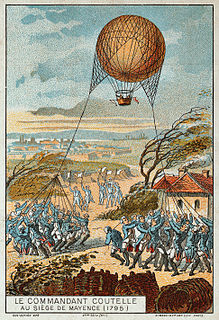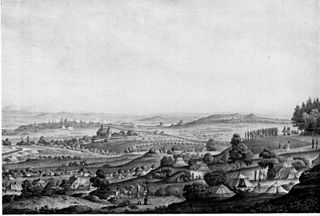 W
WThe Capture of Bacharach took place on 1 October 1620 at Bacharach, Electorate of the Palatinate. The conflict was between the Spanish forces commanded by Don Gonzalo Fernández de Córdoba and the Protestant forces of Frederick V, Elector Palatine, during the Palatinate campaign in the context of the Thirty Years' War. After a quick start of the invasion of states of Frederick V, proclaimed King of Bohemia, the operations slowed in mid-September, after the Capture of Oppenheim. Don Ambrosio Spinola, the Spanish general in command, assessed at a council of war the choice between undertaking the siege of Heidelberg or, secondarily, the town of Bacharach. The Spanish officers decided to take Bacharach due to the small number of Frederick's scattered forces. On 1 October Córdoba captured Bacharach with a force of 2,500 soldiers, forcing the Anglo-German defenders to surrender.
 W
WThe First Battle of Andernach between the West Frankish king Charles the Bald and the East Frankish king Louis the Younger took place on 8 October 876 near Kettig southeast of Andernach and resulted in Charles' complete defeat.
 W
WThe Battle of Göllheim was fought on 2 July 1298 between the forces of duke Albert I of Habsburg and king Adolf of Germany over the prince electors' decision, without electoral act, to dethrone Adolf and proclaim Albert the new king. Adolf died in the battle.
 W
WThe Battle of Kircheib was a military engagement during the War of the First Coalition. On 19 June 1796, French and Austrian troops clashed at Kircheib in the Westerwald uplands in present-day Germany. Sometimes it is called the Battle of Uckerath after another nearby village, Uckerath, which belongs today to Hennef.
 W
WThe Capture of Oppenheim or the Spanish capture of Oppenheim took place on 14 September 1620, at Oppenheim, Electorate of the Palatinate, between the Spanish army commanded by Don Ambrosio Spinola, Marquis of the Balbases, against the forces of the Electoral Palatinate led by Joachim Ernst, Margrave of Brandenburg-Ansbach, during the Palatinate campaign, in the context of the Thirty Years' War. The Spanish troops under Spinola, with a great maneuver of distraction over Worms, deceived the Protestant army of Joachim Ernst, and captured the important town of Oppenheim without too much difficulty, causing a severe blow to the Protestant forces.
 W
WThe Battle of Clausen was fought on 20 October 1735 near the town of Klausen, which was then in the Electorate of Trier and part of the Holy Roman Empire, and is now in the German state of Rhineland-Palatinate. French forces under the command of Marshal François de Franquetot de Coigny were defeated in an attempt to dislodge imperial troops under the command of Friedrich Heinrich von Seckendorff. The battle was one of the last significant engagements between the combatants in the War of the Polish Succession.
 W
WThe Siege of Landau saw an army from the Holy Roman Empire led by Louis William, Margrave of Baden-Baden lay siege to the fortress city of Landau which was held for the Kingdom of France. The French defenders led by Ezéchiel du Mas, Comte de Mélac resisted vigorously but were forced to surrender after a three-month leaguer. This action of the War of the Spanish Succession occurred at Landau in the state of Rhineland-Palatinate, Germany, located 49 kilometres (30 mi) southwest of Mannheim.
 W
WThe Battle of Mainz saw a Habsburg army led by François Sebastien Charles Joseph de Croix, Count of Clerfayt launch a surprise assault against four divisions of the French Army of Rhin-et-Moselle directed by François Ignace Schaal. The right-hand French division fled the battlefield, compelling the other three divisions to retreat with the loss of their siege artillery and many casualties. The War of the First Coalition action was fought near the city of Mainz in the today state of Rhineland-Palatinate in Germany.
 W
WIn the Siege of Mainz, from 14 April to 23 July 1793, a coalition of Prussia, Austria, and other German states led by the Holy Roman Empire besieged and captured Mainz from revolutionary French forces. The allies, especially the Prussians, first tried negotiations, but this failed, and the bombardment of the city began on the night of 17 June.
 W
WOperation Nordwind was the last major German offensive of World War II on the Western Front. It began on 31 December 1944 in Rhineland-Palatinate, Alsace and Lorraine in southwestern Germany and northeastern France, and ended on 25 January 1945. The German offensive was an operational failure, with its main objectives not achieved.
 W
WThe Siege of Bad Kreuznach or the Spanish capture of Bad Kreuznach took place on 10 September 1620, in Bad Kreuznach in the Electorate of the Palatinate, where the Army of Flanders, led by the spanish Don Ambrosio Spinola, conquered the troops of Frederick V, Elector of the Palatinate, during the Palatinate campaign of the Thirty Years' War. The Army of Flanders was a multinational army in the service of the kings of Spain that was based in the Netherlands during the 16th to 18th centuries. Spinola's troops stormed Bad Kreuznach and its garrison surrendered. Later the town was freed on an oath not to rebel against the Holy Roman Empire.
 W
WThe siege of Mainz was a short engagement at the beginning of the War of the First Coalition. The victorious French army of Custine seized the town on October 21, 1792, after three days of siege. The French occupied Mainz, and tried to install the Republic of Mainz there.
 W
WThe Battle of Trippstadt was a relatively-minor French military action in 1794 during the War of the First Coalition. The clash between French Republican forces and the armies of Prussia and Habsburg Austria was fought over several days in the lower Vosges Mountains in the German states west of the Rhine River. Fighting occurred across a wide front and included action in Kaiserslautern, Trippstadt, Schänzel and Neustadt and along the banks of the Speyerbach River.